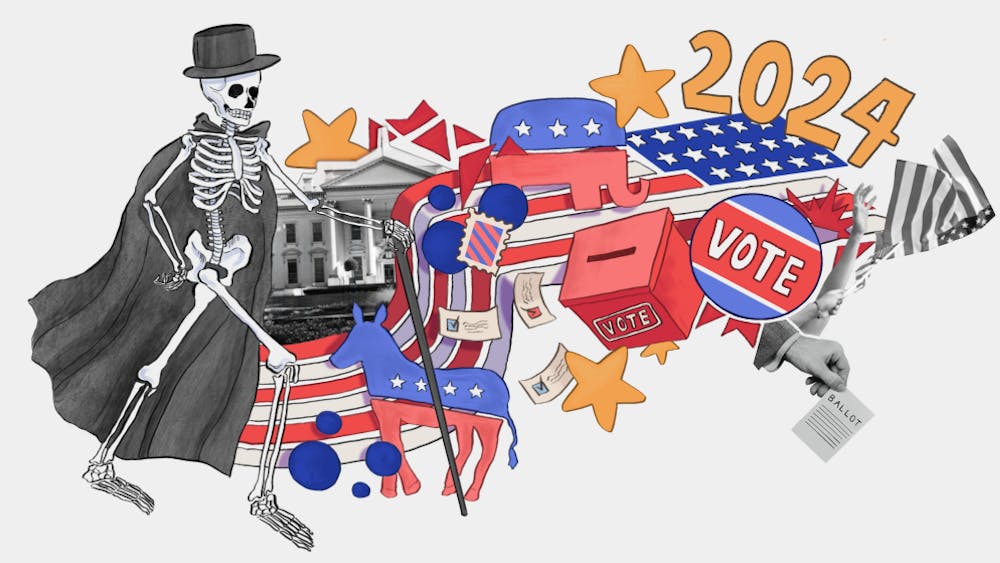
Courtesy of Roadside Attractions
It’s that time of year again. The air is crisper. The leaves are falling. November is closing in on us. Next month, thousands of Americans will travel home and feast on a dinner filled with roast turkey, mouth-watering mashed potatoes and warm pumpkin pie. Or, as writer and director Ike Barinholtz demonstrates in his directorial debut “The Oath,” “the day of thanks” will consist of working through — or more likely, fighting through — familial tensions.
From Barinholtz, known for his work on “MADtv” and his supporting role on “The Mindy Project,” comes a Thanksgiving thriller-comedy fit for 2018. “The Oath”follows a hostile family Thanksgiving dinner, hosted by ultra-political news-junkie Chris (Ike Barinholtz) and his wife Kai (Tiffany Haddish), that quickly turns into a violent, chaotic event. The conflict, set in an alternate, present-day United States, centers around a contentious loyalty oath mandated by the president for all citizens to sign, leading to massive divisions within the family.
Although it is set in a dystopian America, “The Oath” takes influence from the current political climate of the United States and from President Donald J. Trump’s administration. Members of the family represent the whole political spectrum, mirroring each distinctive archetype of American political discourse. Chris’s brother, Pat, played by Barinholtz’s real-life brother Jon, and his girlfriend Abbie (Meredith Hagner), represent Trump’s radical right supporters, while Chris’s parents Eleanor (Nora Dunn) and Hank (Chris Ellis) are mild, centrist conservatives of the likes of Ohio Gov. John Kasich. Chris’ sister Alice (Carrie Brownstein) plays the role of the establishment liberal, while Chris and Kai represent the far left.
“The Oath” finds its strength in its political discourse. Most viewers will find similarities between their family and the film’s characters. Its best scenes are around the dinner table, where Chris and his family members argue over different issues, including signing an oath that declares their loyalty to the government. The most chilling scene occurs when the family goes out to eat and is interrupted by an outburst where a patron loudly disparages other restaurant-goers for “hating America” and for dissenting against the government.
The film begins to lose its vision with the introduction of two agents (Billy Magnussen and John Cho) of the oppressive Citizen’s Protection Unit (CPU), when they visit Chris’s house after receiving a call about his opposition to the government (the call was presumably made by someone in the house). The encounter quickly turns violent, with the agents accidentally knocked out cold. The rest of the film follows the family’s attempt to solve the situation.
While the violence, which makes up most of the second half of the film, produces some of the film’sfunnier moments, it often undermines the deeper message established at the beginning. The jokes become cheaper as the violence increases, and, by the final scenes, the film fails to properly solve the deeper issues within the family. The ending utilizes the contrived plot device of the deus ex machina (an unexpected event that saves a seemingly irreparable situation). The ending does not do justice to the shrewd intricacies that Barinholtz develops in the first half of the film, leaving the viewer unsatisfied.
“The Oath” shows that when Americans go home to visit their families and eat their warm pumpkin pies, they should, instead of preparing for attack, find a common ground with their politically divided families. In 2018, political tensions are as high as ever and Barinholtz believes that listening, not fighting, will solve the deep partisan chasm. While imperfect, “The Oath”gets the political complexity of 2018 right and is particularly salient for voters before the November midterm elections. It is a positive start for Barinholtz and provides a sturdy foundation for his directorial career.





